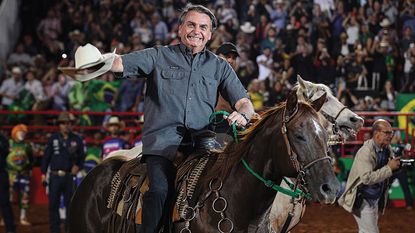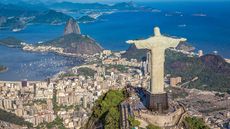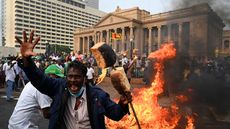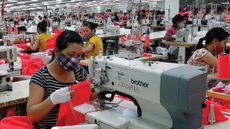Brazilian stocks will bounce back in 2023
Brazil's Ibovespa stockmarket index has fallen by 9% since it peaked in April. But with an election in 2023 and current president Jair Bolsonaro on course to lose, Brazilian stocks could bounce back.


In Sao Paulo, “there is a constant, oppressive hum over the skyscrapers”, says Bruno Meyerfeld in Le Monde, as Brazil’s financial elite use helicopters to get to work.
In 2018 these “one-percenters” overwhelmingly backed Jair Bolsonaro to be Brazil’s president. Now many are disillusioned. Apart from pension reform in 2019, “no major law has been passed”, says Pedro Wongtschowski, chairman of oil and gas distribution giant Ultrapar. Bolsonaro’s endless “outrages and the ransacking of the Amazon” have “ruined Brazil’s image and closed many markets to us”, he says.
Many ordinary Brazilians also hold the president responsible for their hardships, says Bryan Harris in the Financial Times. Brazil has suffered the second-highest Covid-19 death toll globally and inflation is running at more than 10%. Millions of people are going hungry. Bolsonaro is on course to lose the presidential election next month, says The Economist.
Subscribe to MoneyWeek
Subscribe to MoneyWeek today and get your first six magazine issues absolutely FREE

Sign up to Money Morning
Don't miss the latest investment and personal finances news, market analysis, plus money-saving tips with our free twice-daily newsletter
Don't miss the latest investment and personal finances news, market analysis, plus money-saving tips with our free twice-daily newsletter
Polling gives his leftist rival Luiz Inácio Lula da Silva, who served as president between 2003 and 2010, 47% compared with 32% for the incumbent. “Since Brazil’s return to democracy in 1985, the candidate who leads polls two months before the election has gone on to win.” Rhetoric from Bolsonaro about vote fraud suggests that the “Trump of the Tropics” may not accept the result. If he attempts a coup, “people are not sure what the [military] top brass might do”.
A post-election boom?
International observers shouldn’t worry, investment manager Dynamo Administração de Recursos told Vinicius Andrade and Felipe Marques on Bloomberg. “Our experience tells us that Brazil will remain pretty much the same following the vote... without major ruptures.”
The local Ibovespa stockmarket index soared almost 17% in the first three months of the year along with the commodity rally, but has fallen back 9% since it peaked in April. In June local stocks were trading on their cheapest level since 2008 on a forward price/earnings (p/e) basis. Soaring interest rates – up 11.75% since March last year – have prompted investors to sell stocks and buy fixed income.
For now, investors are braced for more volatility, says Craig Mellow in Barron’s. Yet things may improve in 2023. Lula’s choice of a centrist politician as his running mate is a sign that he intends to run a fiscally responsible government. The central bank has “ample room” to slash interest rates from current levels should inflation start to ease.
The stockmarket boasts “a wealth of well-run companies” that have been dragged down by sell-offs. Brazil is notorious for “promising a bright future that never quite materialises”. Yet “during the intervals when hope outweighs disappointment, market returns can be explosive”.

Alex is a member of the UK team at CVC Capital Partners. Prior to joining CVC, Alex worked in the London office of AEA Investors, a mid-market private equity firm. Previously he was part of the UK M&A team at Barclays Capital. Alex holds a BSc in economics from the University of Warwick.
-
-
 Number of ISA millionaires tops 4,000
Number of ISA millionaires tops 4,000The number of ISA millionaires has surged to more than 4,000 - what does it take to hit the seven-figure sum?
By Katie Binns Published
-
 NS&I August Premium Bonds draw - check from today
NS&I August Premium Bonds draw - check from todayNS&I bond investors can check from today to see if they scooped a prize in this month’s draw. With more than £404m to be handed out in prizes, find out what you won.
By Tom Higgins Published
-
 Invest in Brazil as the country gets set for growth
Invest in Brazil as the country gets set for growthCover Story It’s time to invest in Brazil as the economic powerhouse looks set to profit from the two key trends of the next 20 years: the global energy transition and population growth, says James McKeigue.
By James McKeigue Published
-
 Shining a light on India
Shining a light on IndiaAdvertisement Feature Despite some short-term challenges, India remains very attractive for investors. Here’s why.
By moneyweek Published
-
 Seoul attempts to close the “Korea discount” for stocks
Seoul attempts to close the “Korea discount” for stocksNews South Korean stocks suffer from the “Korea discount” – with the country still classified as an emerging market, investors are reluctant to pay a premium.
By Alex Rankine Published
-
 Beware of cheap emerging markets
Beware of cheap emerging marketsNews Emerging markets look cheap, but tread carefully – they tend to be highly cyclical and a global recession would weigh heavily on them.
By Alex Rankine Published
-
 Who will follow Sri Lanka into a debt crisis?
Who will follow Sri Lanka into a debt crisis?News Sri Lanka defaulted on its debt in May as soaring global food prices and a tourism slowdown collided with years of profligate state spending. Which countries could follow?
By Alex Rankine Published
-
 Vietnam makes its mark on the global stage
Vietnam makes its mark on the global stageNews Electronics manufacturers are moving into Vietnam, partly in response to manufacturing delays caused by lockdowns in China. The country’s textile industry is booming, too.
By Alex Rankine Published
-
 What's behind Sri Lanka’s crippling debt crisis?
What's behind Sri Lanka’s crippling debt crisis?Briefings Sri Lanka has been hit by a triple whammy of economic shocks and has gone to the IMF for a bailout. It may just be the first domino to fall in a global debt crisis.
By Simon Wilson Published
-
 Investor optimism ebbs in Indian stockmarkets
Investor optimism ebbs in Indian stockmarketsNews India’s BSE Sensex stockmarket index has fallen by almost 8% so far this year. Interest rates are on the rise, and foreign investors have been selling up.
By Alex Rankine Published









